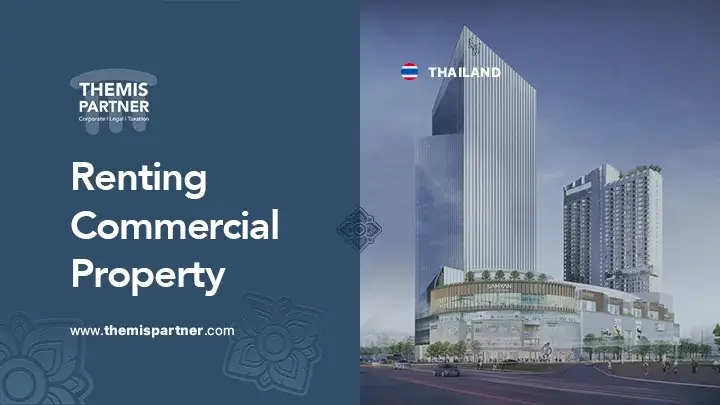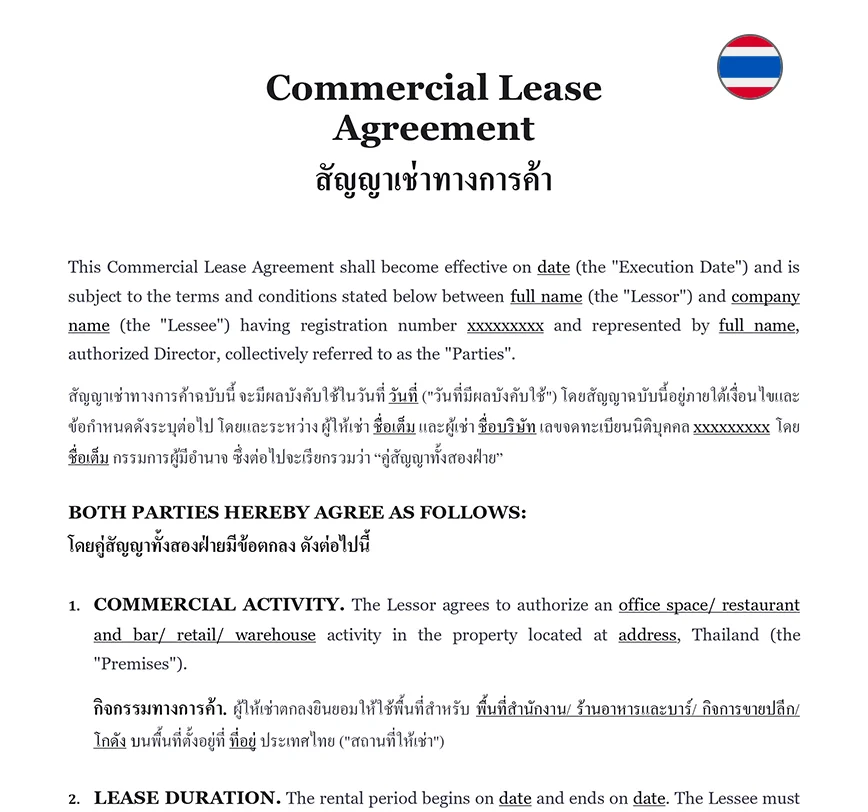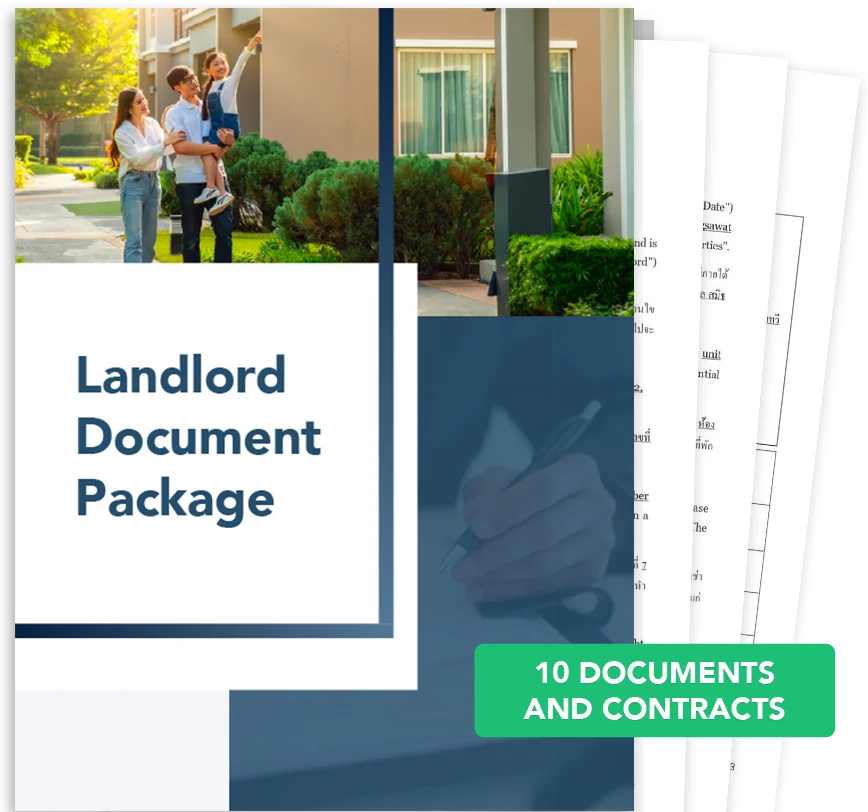Did you know that over 70% of new leases for commercial for rent in Thailand are challenged by registration issues or unclear contracts?
Securing your business premises in Thailand requires more than just finding the right space: it means navigating Thai legal frameworks, registration rules, and hidden pitfalls with precision.

Whether you are a business owner, investor, or professional, understanding these steps is vital for protecting your tenancy, investments, and long-term plans.
Key Takeaways
- Written leases are essential for commercial rentals; only registered contracts over 3 years are fully enforceable.
- Register leases longer than 3 years at the Land Office (fees ~1.1% of lease value).
- Lease terms cap at 30 years (50 for BOI-approved), with each renewal requiring a new contract.
- Assignment and subletting need written landlord consent to avoid termination.
- Foreign tenants must use compliant business entities, verify zoning, and properly register leases.
- Clearly document rent, deposits (1-3 months), and any key money in writing.
- Define maintenance, repairs, and business use to comply with codes and prevent disputes.
- Conduct due diligence on title, zoning, and landlord authority to protect your investment.
Table of Contents
-
Commercial Lease Laws in Thailand
-
Thailand Lease Terms: Duration, Renewal & Transfer
-
Foreign Tenants in Thailand: Key Rental Rules
-
Rent, Deposits & Compliance in Thailand
-
Disputes & Risks in Thai Commercial Leasing
-
FAQ: Renting Commercial Property in Thailand
-
Conclusion
Commercial Lease Laws in Thailand
What Makes a Lease Legally Binding in Thailand?
A commercial lease in Thailand is only legally binding if it complies with the Thai Civil and Commercial Code, as well as the Lease of Immovable Property for Commercial or Industrial Purposes Act.
Written contracts are essential and must be prepared in Thai for registration.
Clear, enforceable lease contracts must include:
- Full legal names of lessee and lessor
- Precise property description and permitted use
- Lease duration (typically up to 30 years)
- Rent terms, renewal rights, security deposit, maintenance obligations
Oral agreements are legally risky. Only written Thai contracts allow registration and, for leases over three years, enforceability beyond the first three years.
How Lease Registration Protects Your Business
Leases longer than three years must be registered at the Land Office or they will only be legally valid for three years.
Key registration facts:
- Fees: approximately 1.1% of total lease value, usually split between parties
- Required documents: signed lease (Thai), ID cards, proof of ownership, property map
- Special cases: Leases up to 50 years available for approved investments exceeding THB 20 million
Unregistered leases lose enforceability after three years. For high-value or long-term commercial for rent in Thailand, proper registration is a non-negotiable safeguard. For process details, consult the Department of Lands Thailand.
Ensuring precise contracts and timely registration secures your tenancy, unlocks investor opportunities, and directly influences your business’s legal stability. These steps help protect your future operations and rental investments in Thailand.
Looking to buy, sell, or lease property in Thailand?
Our team handles registration, title searches, purchase and lease agreements and all property rights.
Thailand Lease Terms: Duration, Renewal & Transfer
Structuring Lease Terms for Flexibility & Security
Standard Commercial Lease Agreements allow a maximum term of 30 years, with the possibility to renew for another 30, though each renewal must be a new contract.
For high-investment projects approved under government promotion, leases up to 50 years are possible, requiring ministerial approval and qualifying investment levels.
Key components to negotiate and clearly define include:
- Lease duration (e.g., 30- or 50-year term, if eligible)
- Renewal process (fresh contract required; pre-agreed renewals are not automatically enforceable)
- Early termination clauses
- Remedies for breach (return of deposit, notice requirements)
Can You Transfer or Sublet a Commercial Lease in Thailand?
Legal restrictions mean tenants may not transfer or sublet the property without the landlord’s written approval.
In practice:
- Written consent is a must for assignments and sublets. (Use the Consent to Sublease Letter to give approval)
- If the property is sold, existing registered leases stay valid, and the new owner must honor the contract
For example, if a tenant sublets without written permission, the landlord can terminate the lease, highlighting the need to negotiate these permissions upfront.
Understanding these rules gives you stronger negotiating power and reduces risk as you seek a commercial for rent in Thailand. Always prioritize written, registered agreements and clarify renewal, subletting, and termination clauses from the start for maximum business security.
Foreign Tenants in Thailand: Key Rental Rules
Legal Barriers & Opportunities for Foreign Businesses
Foreign businesses can rent commercial property in Thailand, but strict rules apply under Thai law.
Foreign tenants cannot own land, but can lease commercial units for:
- Up to 30 years (standard maximum under the Thai Civil and Commercial Code)
- Up to 50 years for BOI-promoted projects with investment above THB 20 million and government approval
Leases exceeding 3 years require registration at the Land Office, with fees around 1.1% of lease value.
To legally operate, foreign businesses must:
- Structure the business entity according to the Foreign Business Act
- Secure the right permits, licenses, and company registrations
Most foreign tenants lease for 30 years and renew, while BOI-backed investors can unlock longer terms if they meet investment and zoning standards.
Navigating Licensing, Approvals & Zoning in Thailand
Each business type must match the property’s zoning restrictions.
Key steps for compliance include:
- Checking if the intended area allows your commercial activity
- Completing licensing through local authorities and ministries
- Applying for Board of Investment (BOI) support if seeking longer lease terms
For updates, see the Thai Foreign Business Act (BOI resource).
Foreign tenants should review zoning, licensing, and approval needs before signing any lease. A strategic approach ensures long-term legal security and smooth business operations.
Rent, Deposits & Compliance in Thailand
How Rent, Key Money & Deposits Are Calculated
Rent in Thailand for commercial properties may be fixed or variable, often linked to market rates or tenant performance.
Key cost structures include:
- Monthly rent: typically agreed as a fixed sum or linked to revenue
- Security deposit: usually one to three months’ rent, refundable after lease expiry if conditions are met
- Key money: a one-time, upfront payment for lease access, separate from rent
It is important to clarify refund conditions and negotiate the deposit terms during contract drafting.
“Key money” is legal but not regulated and should always be documented clearly within the lease agreement to avoid misunderstandings.
Compliance & Maintenance Obligations You Must Know
Every lease must state who handles repairs, insurance, and maintenance.
Checklist for compliance includes:
- Clearly assigning responsibility for routine and emergency repairs
- Specifying permitted business activities, matching property zoning
- Ensuring compliance with building codes and environmental standards
- Updating lease terms after any business change
Non-compliance can lead to fines, contract invalidation, or business interruption.
A well-drafted lease is your strongest protection: make each responsibility and payment obligation explicit before signing.
Disputes & Risks in Thai Commercial Leasing
What Happens in a Lease Dispute or Breach?
If a tenant defaults, such as by missing payments or breaching permitted use terms, landlords may terminate the lease and begin the Thai court enforcement process.
Evidence is crucial: document all payments, communication, and repairs to protect your position if a dispute arises.
Common outcomes and risks include:
- Eviction: After court judgment, tenants can be lawfully removed if non-compliance continues.
- Forfeiture of deposit: Landlords may retain deposits for damages or rent defaults.
- Early termination: Non-payment or misuse can void lease rights before full term.
Download the Eviction Notice Letter to follow proper Thai legal procedures for tenant removal.
Clear lease provisions on breach remedies can reduce misunderstandings and future litigation.
Protecting Yourself from Hidden Rental Risks
Many business owners overlook hidden risks in commercial for rent in Thailand.
Mitigate exposure by:
- Conducting due diligence on property title, zoning permits, and the landlord’s authority.
- Obtaining thorough translations and legal advice, especially for foreigner property rental Thailand cases.
- Using a risk assessment checklist to flag common hazards, from unregistered leases to zoning gaps.
Effective dispute prevention starts with informed preparation: prioritize clear contracts, due diligence, and reliable documentation at every step.
SPECIAL OFFER
Landlord
10 Document Package
Essential documents for managing rental property
FAQ: Renting Commercial Property in Thailand
How Long Can a Commercial Lease Last in Thailand?
The standard lease maximum is 30 years for commercial for rent in Thailand.
Leases up to 50 years are possible for qualified investments that meet specific criteria:
- Must exceed THB 20 million in investment
- Require ministerial approval
- Apply only in specified zones or industrial cases
Renewals require a new contract for each additional term; pre-agreed automatic renewals are not recognized under Thai law.
What Documents Are Needed for Lease Registration?
Registering leases over three years demands:
- Signed lease agreement (in Thai)
- Title deed (Chanote)
- ID cards or passports of all parties
- Power of attorney (if applicable)
- Company registration documents (for companies)
- Payment receipt for the 1.1% registration fee
Translations must be certified, and all parties should attend the registration process.
Are Informal or Verbal Leases Enforceable?
Verbal rental agreements in Thailand are only enforceable for up to three years.
Leases exceeding three years must be in writing and registered at the Land Office; otherwise, courts will only recognize a term of three years.
Does My Lease Stay Valid if the Property Is Sold?
Registered commercial leases continue with the new owner.
Unregistered or short-term leases carry higher risk; written and registered leases legally protect a tenant’s right to stay for the full agreed period under business law Thailand.
A properly structured lease provides legal certainty throughout ownership changes, making landlord sales less disruptive to tenants.
Conclusion
Securing commercial property in Thailand demands strategy, precision, and a clear understanding of the legal landscape, this is your key to building lasting business stability.
Take decisive action by reviewing your lease draft, ensuring all terms are in writing and registered, and conducting thorough due diligence on both title and zoning.
Prioritize explicit clauses for renewals, subletting, and compliance from the outset, clarity is your strongest safeguard.
If you’re seeking full confidence at every stage, contact us. Themis Partner brings deep legal expertise and hands-on support to streamline your commercial lease process, protect your interests, and empower informed decisions so you can focus fully on growing your business.


